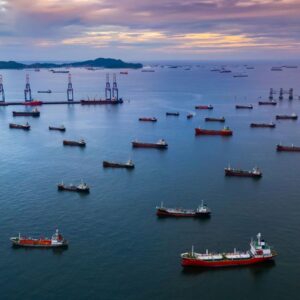Singapore and Japan have inked an agreement to establish the world’s first Green and Digital Shipping Corridor (GDSC). On December 16, 2023, the Singaporean Ministry of Transport and the Japanese Ministry of Land, Infrastructure, Transport, and Tourism inked an agreement to develop best practices and standards for decarbonising and digitising the maritime sector.
The Singapore-Japan GDSC reflects both nations’ strong commitment to expedite efforts towards maritime sustainability. In this groundbreaking collaboration, the Maritime and Port Authority of Singapore (MPA Singapore) will collaborate with six major Japanese ports: the Port of Tokyo, the Port of Yokohama, and the Port of Kawasaki in the Kanto Region; the Port of Osaka, the Port of Kobe in the Kansai Region; and the Port of Nagoya in the Chubu Region.
GDSC reflects both nations’ strong commitment to expedite efforts towards maritime sustainability. In this groundbreaking collaboration, the Maritime and Port Authority of Singapore (MPA Singapore) will collaborate with six major Japanese ports: the Port of Tokyo, the Port of Yokohama, and the Port of Kawasaki in the Kanto Region; the Port of Osaka, the Port of Kobe in the Kansai Region; and the Port of Nagoya in the Chubu Region.
The GDSC platform will be used for pilot programmes and testing with alternative marine fuels such as ammonia and hydrogen. MPA and its Japanese port partners will collaborate to build bunkering infrastructure, develop standards, and provide training to encourage the use of these sustainable fuels. The programme promotes the deployment of technology that reduces greenhouse gas emissions in port infrastructure.
In terms of digitisation, Singapore and Japan plan to use digital technologies to speed up port clearance operations. The collaboration will encompass the exchange of information and best practices on the dangers connected with marine cybersecurity and other areas of maritime digitalization.
MPA Singapore emphasised the significance of this MoC and its role in accelerating the digitalization and decarbonisation of the marine industry. The GDSC is projected to contribute in the development of more competent ports with digital technologies and a workable supply chain for fuels with zero or almost zero greenhouse gas emissions.
Singapore’s top 10 trading partners include Japan. Global efforts to fulfil the 1.5-degree objective, boost the use of alternative fuels, and accelerate the shipping industry’s comprehensive decarbonisation align with the development of green shipping routes.
